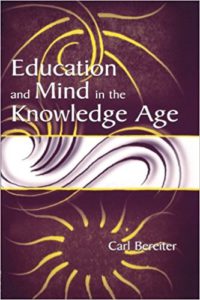 I am in the middle of rereading Carl Bereiter’s 2002 book Education and Mind in the Knowledge Age. Among the intriguing ideas is the book is his confrontation of the “mind as a container” metaphor. Recent generations of educators have operated under the assumption that one’s brain is a container and that what we know is stored within the container. Educators who work under this “folk psychology” will either see their work as transferring knowledge into that container or allow learners to construct knowledge within that container.
I am in the middle of rereading Carl Bereiter’s 2002 book Education and Mind in the Knowledge Age. Among the intriguing ideas is the book is his confrontation of the “mind as a container” metaphor. Recent generations of educators have operated under the assumption that one’s brain is a container and that what we know is stored within the container. Educators who work under this “folk psychology” will either see their work as transferring knowledge into that container or allow learners to construct knowledge within that container.
The details of Bereiter’s challenge to this concept are left for another post. The current post summarizes his six kinds of personal knowledge that are part of the chapter “Aspects of Knowledgeablity.” We who work in education are used to reading about (and focusing our practice around) declarative knowledge and skills, but Bereiter suggests we gain a more accurate view of what humans can know by expanding our typology:
Statable Knowledge- Bereiter uses the word “statable” (that which we can state) whereas much of literature and most practitioners call this declarative knowledge.
Implicit Understanding- Our implicit understanding comprises those “things” we know without the need (or even the ability) to explain. Bereiter uses the example of seeing a dish fall. We use our implicit knowledge to predict it will break, and maybe use it quickly in an attempt to catch it.
Episodic Knowledge- Our lives comprise many events and these become the basis for our episodic knowledge. There are lessons to be learned from remembering the important episodes of our lives, and we use stories (called cases studies in our textbooks) to illustrate and remember this knowledge.
Impressionistic Knowledge- When we decide whom to trust, Bereiter claims, we are using our impressionistic knowledge; it is grounded in both our emotions and our knowledge. Impressionistic knowledge is difficult to explain and codify, however. We often claim those with well-developed impressionistic knowledge demonstrate wisdom, and they may be called connoisseurs.
Skill- Knowing how to is the foundation of all skill. We know part of skills is cognitive, but part of it is sub-cognitive, and we marvel at the automaticity of skilled practitioners. They have internalized the actions that they appear effortless.
Regulative Knowledge- We are all familiar with metacognition, and it is a component of regulative knowledge, but Bereiter extends this type of knowledge to include ideas such as perfection, equity, objectivity, and truth. Within this type of knowledge, Bereiter claims are “a wide range, from explicit principles that may be debated and codified as codes of ethics or by-laws” to very specific strategies that we have for how we conduct ourselves such as how we “deal with assertive people.”
Because it is easy to measure statable knowledge and skill, Bereiter observes, these two types of knowledge tend to focus education and knowledge work, but developing competence and expertise in any field requires capacity to “know” in each type of knowledge. More complete knowledge, and knowledge that can be used to make later decisions, and knowledge that can be improved exist in all six areas. It seems the future of schools depends on educators’ capacity to improve all types of learning.